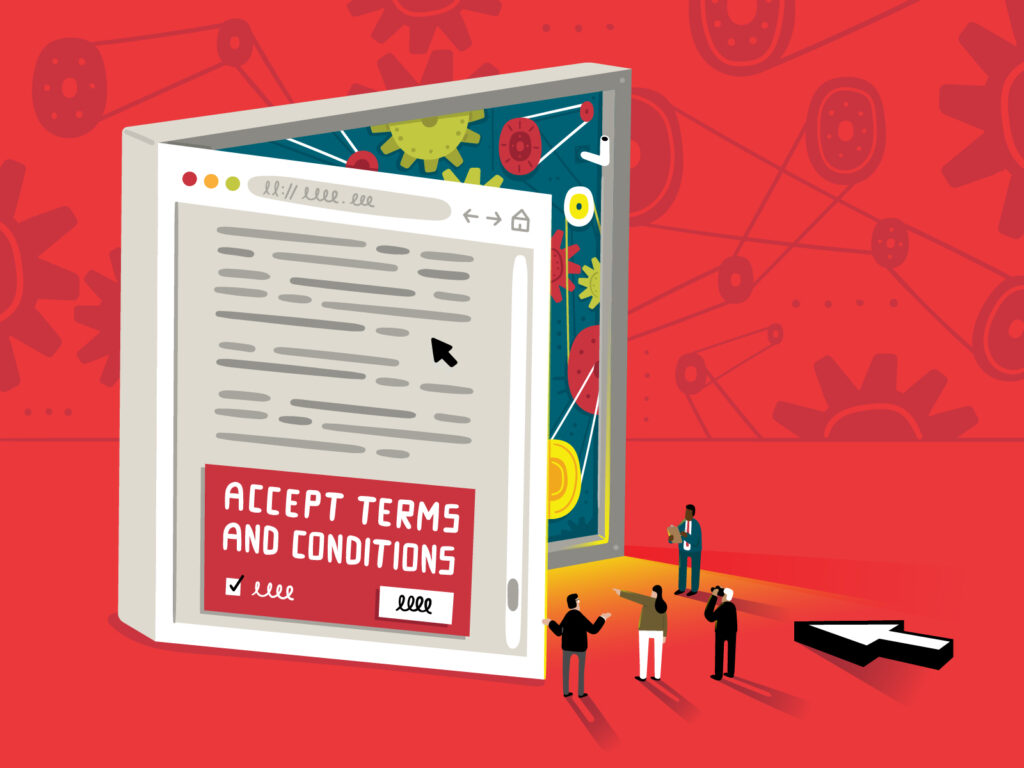Consumers don’t trust what they don’t understand.
It makes digital service and social media companies that depend on dense terms of use contracts some of the least trusted companies out there.
But what if these companies were upfront about what consumers were giving up in return for free services? Researchers at the Terry College of Business wanted to know how much trust tech companies gain with more transparent user terms.
“You have these thousands of word-long contracts in a language that most ordinary people cannot understand,” said Tari Dagogo-Jack, an assistant professor of marketing at the University of Georgia Terry College of Business. “So, if you can rewrite this statement or rewrite sections of the contract in words that everyone can understand, then they should be more willing to trust you. But it’s a double-edged sword.”
Dagogo-Jack and his coauthor, Terry College legal studies associate professor Tim Samples, published their findings in the Journal of the Association for Consumer Research. They found that transparency increased consumer trust, but only to a point.
Samples’s past research focused on the digital contracting as well as international investment law. Dagogo-Jack’s work focuses on the consumer psychology of brands.
Decades of research show people believe and trust things that are easy to understand, but the average social media contract is 6,712 words in dense legalese. Some platforms use plain language summaries and other tools to help more laypeople understand what they’re agreeing to.
“We noticed that some platforms are taking a friendlier approach,” Samples said. “They still give you the legal jargon and the contract language, but they give you little plain English captions to go with it. It got our attention. And we were wondering: How would these be perceived by consumers and the public?”
In five studies, Samples and Dagogo-Jack presented consumers with different terms of use statements, either with or without plain language summaries. They asked how well participants understood the contracts’ terms, how much they trusted the company behind the contract, and how comfortable they felt sharing personal information with the companies.
Participants inherently trusted companies using plain language summaries more and were more willing to share personal information with them. Furthermore, that trust was driven by how well they understood the contract provisions.
“There was a symbolic interpretation of providing these summaries of the contracts and then there was the literal interpretation of what the contracts say,” Dagogo-Jack said. “Symbolically, the fact you are making it easy for me to understand is a great thing … Most companies aren’t doing that, so they’re clearly on my side.”
“On the other hand, because they’ve made it easy for me to understand, now I can read literally what they’re saying — ‘I’m taking your data, I can use it however I want, and you have no legal recourse.’ Obviously, I don’t want to give my data to a company like that.”
The space between the consumer perception of trustworthiness stemming from merely providing these summaries and the actual trust of consumers — once they read through the contract synopses — provides takeaways for marketers, consumer groups, and policymakers.
“This can be a marketing opportunity,” Samples said. “(Providing plain language summaries) provides a positive message around your contracting. You’re saying, ‘Hey, we’re not like the rest of these guys. We do things a little differently. We’re not trying to bruise you in this contracting relationship … We’re doing something reasonable here.’”
Companies such as Pinterest and Kickstarter are already taking advantage of this approach. Other tactics include Anthropic utilizing its own AI model to simplify user terms and Meta using video and interactive graphics to make their terms of use more approachable.
This could be good if users start choosing companies to do business with based on contract terms. If they gravitate toward services with more user-friendly terms in their contracts, that will incentivize companies to develop more user-friendly policies to attract users, Samples said.
On the other hand, the team also saw the danger of marketers engaging in “privacy washing” — employing friendly language and summaries to make users feel like they’re giving data to trustworthy entities.
“You’re not going to be able to summarize and animate your way to consumer trust if your company depends on selling access to people’s data to advertisers, and so on,” Dagogo-Jack said. “But that doesn’t stop them from trying.”
In the future, Dagogo-Jack and Samples hope to investigate how multimedia presentations and other aesthetic factors in terms of use contracts impact consumer trust in tech companies.

